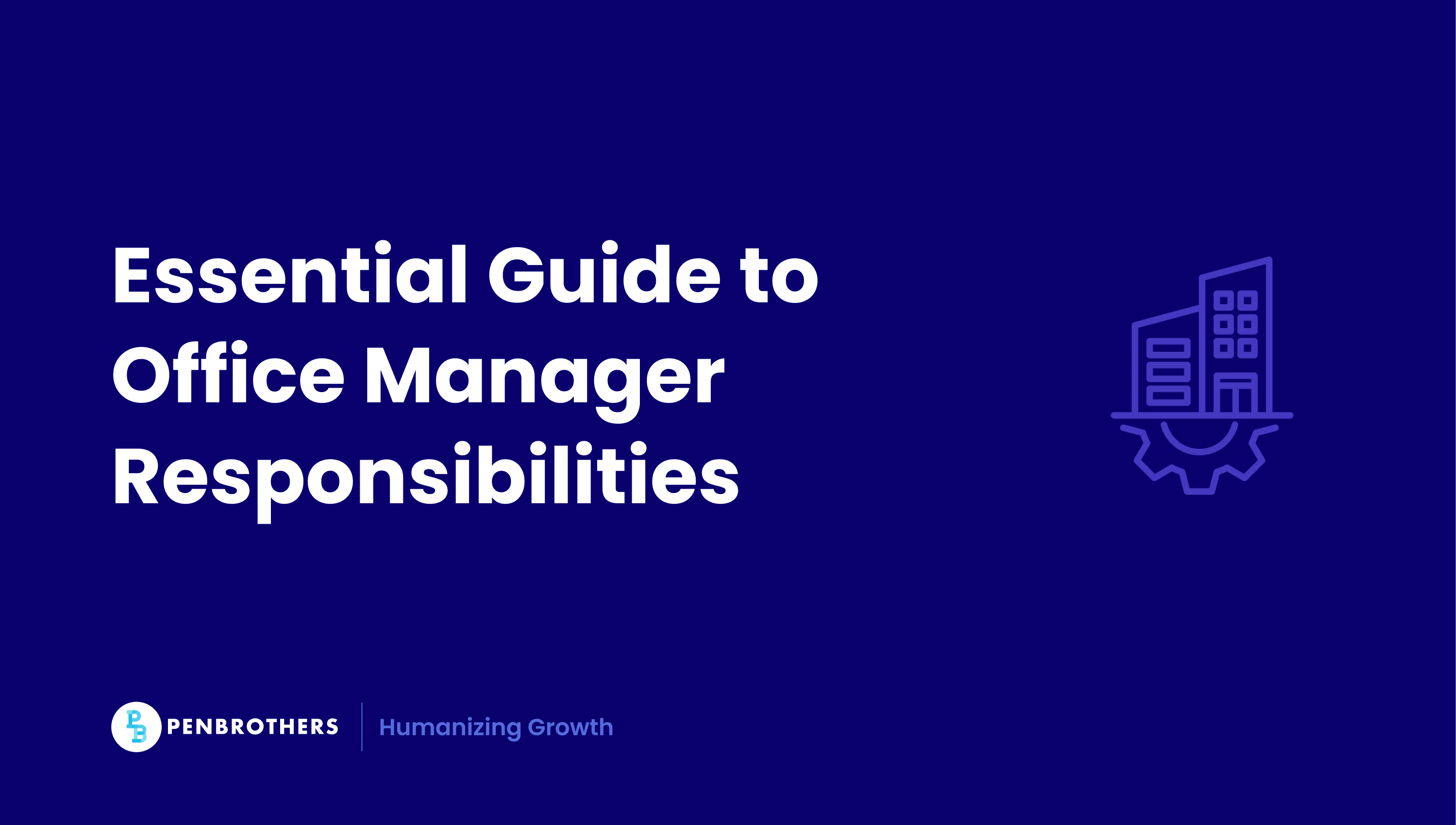What's Inside?
Office Manager Job Description: Duties, Skills, and Career Path

Picture this: the printer is jammed, invoices are overdue, two candidates are waiting in the lobby, and no one can find the updated meeting schedule. Without an office manager, even the best teams stumble. Now flip the scene, everything runs smoothly, visitors feel welcomed, budgets are tracked, and employees know exactly where to find what they need. That invisible glue? The office manager.
For both employers and job seekers, a well-defined office manager job description sets the tone for success. Employers attract the right candidates, while professionals understand the skills and responsibilities expected of them. Let’s break down this critical role.
What Is an Office Manager?
An office manager is the central figure ensuring that daily operations run efficiently, safely, and in alignment with business goals. They oversee everything from administrative systems to workplace culture, acting as the bridge between leadership and employees.
It’s important not to confuse the role with related positions:
- Office administrator: Often handles routine clerical tasks without strategic oversight.
- Executive assistant: Focuses on supporting a single leader or small leadership team.
- Coordinator: Specializes in specific areas like events or facilities, not the full spectrum of office operations.
Unlike these narrower roles, the office manager wears multiple hats, administrator, budget overseer, people leader, and culture builder.
Office Manager Duties and Responsibilities
The heart of any office manager job description is the responsibility list. Employers must define these clearly to avoid mismatched expectations. Based on industry-standard sources like Indeed, LinkedIn, and Monster, responsibilities fall into five main categories:
1. Administrative Management
- Maintain filing systems (digital and physical)
- Manage correspondence and scheduling
- Oversee reception and visitor experience
2. Financial Oversight
- Track office budgets and expenditures
- Process invoices and vendor payments
- Negotiate and manage contracts with suppliers
3. Facilities and Resources
- Order and monitor office supplies
- Ensure equipment maintenance and IT support coordination
- Manage office safety and compliance
4. HR Support
- Assist with onboarding new employees
- Maintain employee records and compliance documents
- Support policy rollouts and employee queries
5. Culture and Events
- Organize team-building activities and company events
- Coordinate hybrid work arrangements and engagement efforts (see hybrid work strategies)
- Foster an inclusive, welcoming workplace environment
Each of these duties should be tailored to company size. For example, in a startup, office managers often handle financial reporting directly, while in a larger enterprise, they may focus more on people management and vendor coordination.
Essential Skills and Qualifications
Must-Have Skills
- Organization and multitasking: Balancing shifting priorities without dropping details.
- Communication: Clear written and verbal interaction with staff, vendors, and leadership.
- Tech proficiency: Familiarity with office software, scheduling tools, and sometimes HRIS or ERP systems.
- Financial acumen: Budget tracking and invoice processing.
Soft Skills
- Adaptability: Thriving in dynamic environments.
- People management: Supporting staff while maintaining authority.
- Confidentiality: Handling sensitive information with discretion.
- Problem-solving: Anticipating issues and finding practical solutions. Today’s expectations go further: modern office managers are also tasked with promoting well-being, supporting hybrid work, and cultivating an empathetic workplace culture.
Nice-to-Have
- Certifications like CAP (Certified Administrative Professional) or PMP (Project Management Professional).
- Industry-specific knowledge (for example, compliance in healthcare or financial reporting in banking).
Experience and Education Requirements
The path to becoming an office manager is diverse:
- Career progression: Many start as office assistants, coordinators, or team leads. Over time, exposure to financial and HR functions paves the way for leadership. (Learn more about team lead responsibilities).
- Education: A bachelor’s degree in business administration or management is common, but not always mandatory. Increasingly, employers embrace skills-first hiring, valuing hands-on experience and certifications.
This flexibility opens the door for professionals who excel in execution but may not have formal degrees.
Salary Expectations and Career Growth
Compensation for office managers depends heavily on location, industry, and company size.
- Philippines: The average annual salary is around USD 21,384
- United States: The average annual salary is around USD 42,296
This difference reflects not just cost-of-living gaps, but also the growing opportunity for global employers to build cost-efficient offshore teams without sacrificing quality.
Beyond base pay, office managers often gain access to bonuses, benefits, and flexible work arrangements.
Career paths include:
- Senior office manager (overseeing multiple sites or larger teams)
- Operations manager (transitioning into broader business strategy)
- HR manager (leveraging employee relations expertise)
- Project coordinator/manager (specializing in cross-department initiatives)
In larger organizations, some office managers even move into middle management roles, bridging operational efficiency with leadership strategy.
How to Write an Effective Office Manager Job Description (For Employers)
For companies, the office manager role is too critical to leave vague. A strong job description helps filter out unqualified applicants while appealing to top talent.
Tips for Writing a Strong JD
- Start with clarity: Use “Office Manager” in the title, not vague alternatives like “Operations Ninja.”
- Engage upfront: Introduce the company mission and how the office manager contributes to it.
- Be specific: List responsibilities under categories like “Financial Oversight” instead of generic “managing budgets.”
- Disclose details: Salary ranges, working hours, remote policies, and benefits attract the right applicants.
- Show culture: Highlight inclusivity, team events, and flexibility.
Example Snippet of a Strong JD
“We are seeking an Office Manager to ensure seamless daily operations across our growing team. The role includes budget oversight, HR support, and event coordination. You will act as the hub connecting leadership, staff, and vendors, keeping our workplace efficient and welcoming. This is a full-time hybrid role based in New York, with a salary range of $60,000–$70,000 plus benefits.”
This sample is short, clear, and communicates both responsibility and opportunity.
Free Resource: [Download our Office Manager Job Description Template] (link) to get a ready-to-use framework you can customize for your company.
Office Manager Job Description
For inspiration, see how roles like virtual office managers are framed for modern workplaces.
Final Thoughts
An office manager is more than a scheduler or supply keeper, they are the operational backbone that drives productivity, financial order, and workplace culture. Clear job descriptions not only attract the right talent but also set the stage for long-term success.
Research shows that when culture is reinforced by leadership, employees are more satisfied, committed, and productive, proof that office managers elevate both people and performance.
If you’re looking to build a reliable team with the right office management talent, Penbrothers can help you find, hire, and support top professionals who scale with your business.
*This article was crafted with the support of AI technology and refined by a human editor.





